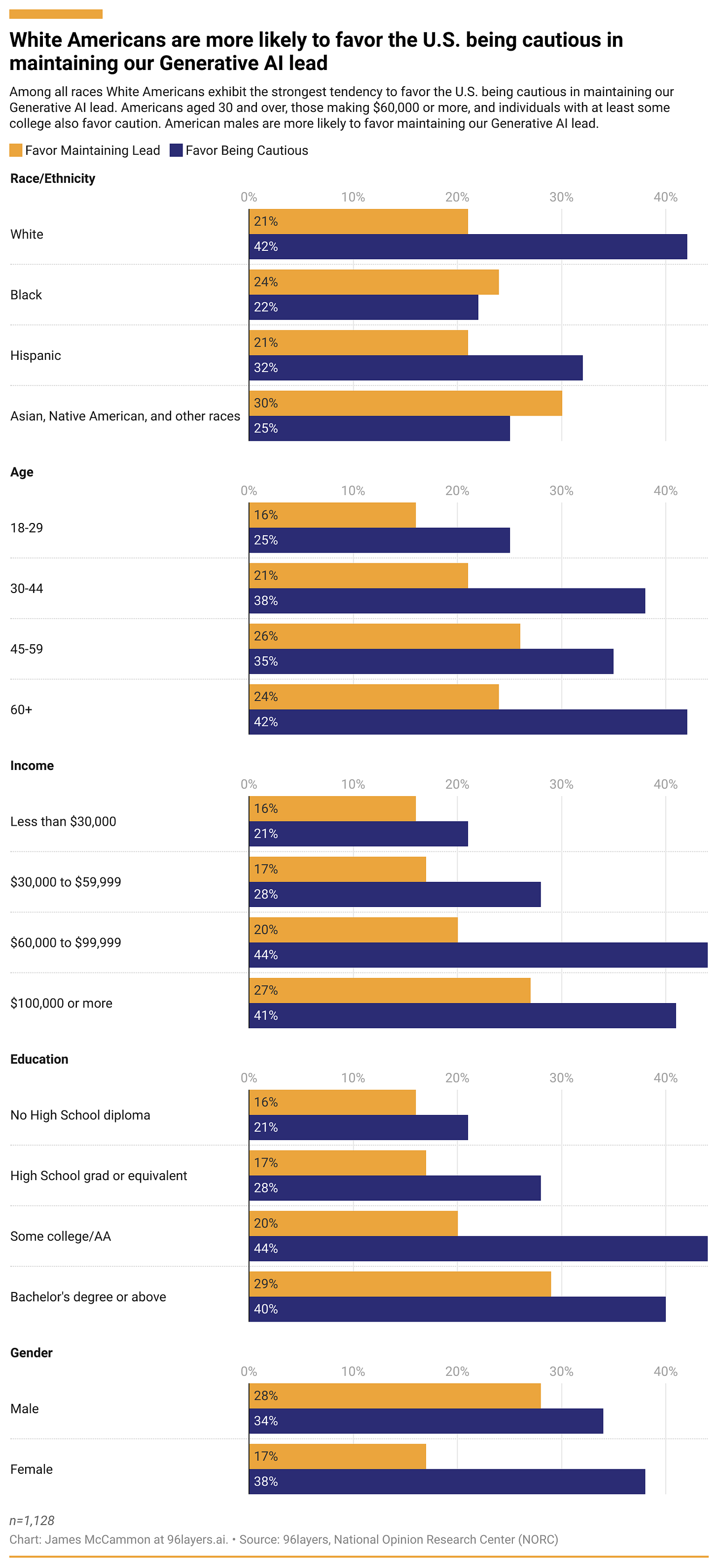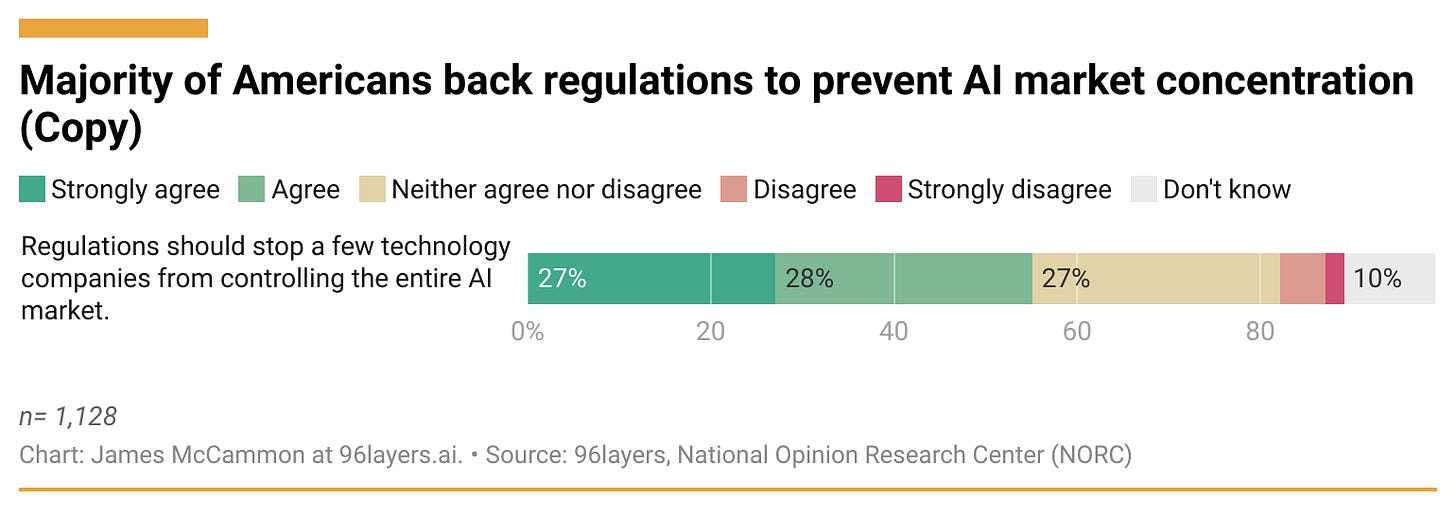When it comes to Generative AI, Americans are split over the United States maintaining its lead
But the majority support sanctions or other global penalties for countries that misuse AI.
This article is part of my ongoing coverage of the 2023 Generative AI & American Society Survey, a nationally representative survey of Americans conducted by the National Opinion Research Center (NORC) at the University of Chicago. Known for producing some of the most scientifically rigorous surveys in the United States, NORC was my chosen partner for this project, which I both wrote and funded. For more details on the survey, you can check out the project FAQ.
Moderately more Americans favor being cautious than favor keeping the U.S. lead in Generative AI
While Generative AI is an emerging technology, the U.S. currently holds a clear advantage in the field. Both ChatGPT, the leading AI language model, and Midjourney, the most popular text-to-image platform, are products of U.S.-based companies. Major tech giants investing in this area, such as Google, Microsoft, and Adobe, are also headquartered in the U.S. Additionally, rising contenders in the space, like Anthropic and Hugging Face, are American-based companies.
New York Senator Chuck Schumer recently discussed America's leading position in Generative AI during a speech at the Center for Strategic and International Studies. Schumer is the sponsor of the SAFE Innovation Framework for Generative AI, legislation aimed at balancing increased regulation with the preservation of the U.S. lead in the field. Senator Schumer noted the following in his remarks:
There are those who fear AI’s immense power and conclude it’s better to turn back, to go no further down this unknown road. We all know it’s not that simple and it’s not that easy. The AI revolution is going to happen with us or without us. If we can promote innovation, make sure it is safe, if America leads the way, the future will be far better, brighter, and safer than if it happens without us.
When asked about the U.S. preserving its global leadership in Generative AI, 36% of Americans lean toward exercising caution, compared to 22% who endorse maintaining our lead.
These cautious views are notable given that Americans were presented with both the potential benefits, such as better living standards and enhanced national security, as well as possible downsides like job loss and AI-generated misinformation. The precise question wording was:
Think about the U.S. keeping its global lead in Generative AI. Benefits could include better living standards, strong economic growth, and improved national security. However, there might also be downsides like job losses, AI-driven cyberattacks, and misinformation created by AI. Given these benefits and downsides, where do you stand?
Men are more likely than women to favor maintaining the U.S. lead, with 28% of male respondents supporting this stance compared to 17% of females. However, a cautious approach garners broader support across genders, with 34% of men and 38% of women favoring caution.
Age also plays a role; the 60 and above age group is most likely to favor a cautious approach, at 42%, while those aged 18-29 are least likely to support either maintaining the lead or being cautious (16% and 25%, respectively). People with higher income levels — those making $60,000 per year and above — also appear more inclined to favor a cautious approach. Specifically, 47% of Americans earning between $60,000 and $100,000 per year, and 41% of those earning above $100,000 per year, advocate for a cautious approach to Generative AI.
Educationally, those with some college education or a bachelor's degree are more likely to both support maintaining the lead and favoring caution, at rates of 20% and 29% for maintaining the lead, and 44% and 40% for caution, respectively. White Americans, more than any other racial or ethnic group, are likely to advocate caution, at 42%.
Americans back global penalties if countries misuse Generative AI
In October 2022, the Biden administration imposed sanctions on China, specifically targeting advanced semiconductors and chip-manufacturing equipment used in AI systems. These measures aim to curb China’s “large-scale surveillance activities enabling human-rights violations and abuses.” Additional AI-focused sanctions were enacted in August 2023.
The 2023 Generative AI & American Society Survey found that a majority of Americans, 54%, support such global penalties, including sanctions, for countries that misuse Generative AI technologies. Only 7% disagree, while 25% neither agree nor disagree.
There are notable demographic differences in attitudes towards imposing global penalties, such as sanctions, on countries that misuse AI technologies.
Age appears to influence opinions: Older age groups (60+) were more likely to agree with such penalties at 61%, whereas the 18-29 age group showed the least agreement at 45%.
Gender also plays a role. Males were more likely to agree with the sanctions, at 59%, compared to females at 51%.
In terms of education, those with a Bachelor's degree or higher were the most likely to agree, at 69%. On the other end, individuals without a high school diploma were the least likely to agree, at 46%.
Among racial and ethnic groups, White Americans showed the highest level of agreement at 60%, while Hispanic and Black respondents were less likely to agree, at 45% and 41% respectively.
Household income also impacts views on this issue. Those in the highest income bracket ($100k+) were the most supportive, with a 66% agreement rate, while those earning less than $30k were least supportive, at 37%.
Overall, these findings suggest that opinions on global penalties for the misuse of AI technologies are shaped by a variety of demographic factors.
Opinions on global penalties included priming respondents to consider both the potential benefits and tradeoffs of such a policy:
Idea: Some countries might misuse AI technology to harm their citizens or threaten democratic values. If they do, these countries should face global penalties, such as sanctions.
Benefit: This could deter nations from abusing AI technology. It might encourage them to follow global democratic principles.
Tradeoff: This could reduce teamwork among nations. Prices could rise from less global trade. It could also spark diplomatic tensions.
How were these figures determined?
Results from the 2023 Generative AI & American Society Survey came from the National Opinion Research Center’s probability-based AmeriSpeak panel of adults ages 18 and over. The sample size was 1,147 and responses were weighted to ensure national representation. The exact questions posed to respondents about both the U.S. maintaining its lead and about global penalties are shown below. For more information, please refer to the FAQ page.
U.S. keeping lead question
The survey responses to this question were randomized so that half of respondents saw the scale starting with “Strongly favor keeping our lead” and the other half saw it starting with “Strongly favor being cautious.”
Think about the U.S. keeping its global lead in Generative AI. Benefits could include better living standards, strong economic growth, and improved national security. However, there might also be downsides like job losses, AI-driven cyberattacks, and misinformation created by AI. Given these benefits and downsides, where do you stand?
Strongly favor keeping our lead
Somewhat favor keeping our lead
Neutral
Somewhat favor being cautious
Strongly favor being cautious
I don't know
Global penalties question
A total of 13 policy questions were presented in a grid format, grouped into three thematic categories. Each question allowed respondents to choose their level of agreement. The order of the 13 questions presented to respondents was randomized. Each policy question included an idea along with potential benefits and tradeoffs.
The following are some ideas for how governments might handle Generative AI. Each idea has benefits, but there could also be downsides, or "tradeoffs". We've included potential benefits and tradeoffs for context, but there might be more that we haven’t mentioned.
Indicate how much you agree or disagree with each idea. Keep in mind, your opinion is only about the idea itself. The benefit and tradeoff might help guide your opinion.
Idea: Some countries might misuse AI technology to harm their citizens or threaten democratic values. If they do, these countries should face global penalties, such as sanctions.
Benefit: This could deter nations from abusing AI technology. It might encourage them to follow global democratic principles.
Tradeoff: This could reduce teamwork among nations. Prices could rise from less global trade. It could also spark diplomatic tensions.
Strongly agree
Agree
Neither agree nor disagree
Disagree
Strongly disagree
Don’t know
If you have additional questions, comments, or suggestions please do leave a comment below or email me at james@96layers.ai. To help advance the understanding of public attitudes about Generative AI I’m making all raw data behind the 2023 Generative AI & American Society Survey available free of charge. Please email me if you’re interested.






